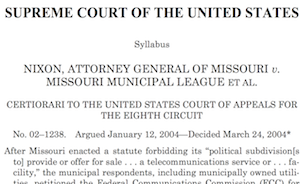
Black letter law.
The FCC has to win an uphill fight against past court decisions if Thursday’s expected preemption of two particular state bans on municipal broadband is to have any practical effect.
The primary obstacle is Gregory v. Ashcroft, a 1991 U.S. supreme court decision that said, in effect, if congress wants to “upset the usual constitutional balance of federal and state powers” then it must make that intention “unmistakably clear in the language of the statute”. In 2004, the supreme court relied on that principle in Nixon v. Missouri Municipal League, which – seemingly very plainly – said congress didn’t give the FCC authority to interfere with how states manage the telecoms activities of subordinate agencies. Cities and counties are not independent: both are created by state governments and given particular responsibilities and powers, which vary from state to state.
But it’s a lawyer’s job to find loopholes and end runs around problems like that. So expect the FCC’s decision to explain why this time is different. Possible lines of attack include…
- The Nixon case was about one particular section of U.S. telecoms law and there’s another section – 706 – that actually does give the FCC that power. Look for some kind of basis for saying the very broadband language of section 706, which the courts have already found inadequate to support net neutrality rules, is a “plain statement” by congress in “unmistakably clear” terms that it intended to give the FCC authority to tell states how to delegate broadband work to cities and counties.
- Broadband service is so fundamentally different from, say, wireline telephone that it can only be regulated at the federal level, if the FCC is to achieve the goals set by congress.
- At least one of the muni utilities involved in the FCC proceeding – Chattanooga, Tennessee, possibly – is actually an independent corporation rather than a political subdivision of its respective state. That’s a scenario the Nixon decision specifically avoids addressing.
To withstand court challenges, the FCC’s decision has to demonstrate why its authority to preempt state management of subordinate agencies either meets the unmistakably clear plain statement standard or is irrelevant to it. That’ll be a tough case to make, but I’m looking forward to reading it.
